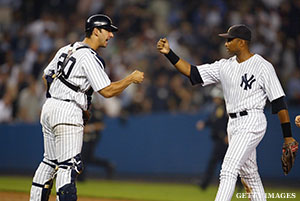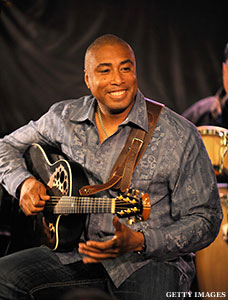
Jorge Posada must feel like a lonely man. From 1995 through 2010, he played 1,714 games in pinstripes, making five All-Star teams and winning five World Series titles. From 2000-2010, he led all MLB catchers in home runs, RBI and runs. With Carlos Delgado's retirement last month, Posada is also the longest tenured Puerto Rican player in Major League Baseball.
And then, two weeks ago, all the success seemed to disappear. Posada, who has played 38 games at designated hitter and one at first base in 2011, was dropped down to the No. 9 spot in the order. He promptly pulled himself out of the lineup, partly blaming his stiff back and partly his sub-Mendoza Line slump. The media blamed his ego. The coaches were annoyed. The fans were confused. Who could possibly relate to Posada's situation?
Jorge, let's bring in your old friend Bernie Williams.
Consider: 1,945 games in pinstripes, five All-Star teams, four World Series rings and the all-time record for postseason home runs (22). No, these are not a repeat of Posada's stats. These are Williams' stats when he arrived for Yankees spring training in March 2006. Like Posada, the long-time Puerto Rican-born Yankee was coming off his worst statistical full season and was placed at the top of the depth chart -- at DH. On Opening Day, he batted seventh in the order.
"I think it's very important for him to basically just take this attitude of 'What have you done for me lately' and basically every day think of himself as a rookie and basically just go back to scratch and say, you know, every day I have to prove to these people that I can play, so I'm just gonna do that," Williams said in an exclusive interview with ThePostGame.
Williams' 462 plate appearances in 2006 were his lowest total since 1992 when he played in only 62 games. But that didn't stop Williams from being productive. The former batting champion batted .281 as a DH and utility outfielder, spending most games at the bottom half of the Yankee order. He knew he had to fight to stay in the lineup every day.
"You're kinda like the last one to sort of figure out that people are not thinking about you the same [way] that you're thinking about yourself," Williams said about the back end of both his and Posada's careers. "And I think, you know, from a player's standpoint, that’s the hardest thing to adapt to."
Despite Posada's struggles, Williams still believes in his former teammate.
"Even if you don't really feel like you're up to 100 percent, you kind of psych yourself into believing that you can and most of the time you do because you're able to overcome that mental and that physical limitation that you may have one game or another," he said. "And I think you train yourself to think that you can do everything. You still think that you can do everything and you still have that confidence in yourself, but people around you don't have the same way of thinking. ... He has to keep playing and keep proving to them, even more now than ever, that he can still produce."

Williams' 2006 season was his last in Major League Baseball. Despite going above and beyond expectations in 2006, the Yankees refused to guarantee him a roster spot entering spring training in 2007. Williams then declined offers from any other ball club.
But Williams was OK ending his career that way. His retirement (although still not official) gave him a chance to focus on his other love in life: Music.
In 2009, Williams released his second jazz studio album, "Moving Forward." The album, featuring Bruce Springsteen, Dave Koz and Wayman Tisdale, received a nomination for Best Latin Jazz Album at the Latin Grammy Awards.
"We’ve been playing music from that CD and the one that I had before, called the Journey Within, for the last two and half years," Williams said about the popularity of "Moving Forward," which peaked at No. 2 on the Billboard Top Contemporary Jazz Album Chart in 2009.
Williams goes into detail about his love of music in a book, "Rhythms of the Game," which is scheduled to be published in July. "Even since I was a little kid, I was able to make sense of the world through music," Williams said. "When I started picking up the guitar at 8 years old, I knew that my connection through life, you know, in big part, was gonna be through music."
Music and baseball have been complementary aspects in his life. "I was able to draw a parallel between the things that I've been able to utilize in music that have helped me in baseball and now, things that I’ve utilized in baseball that are helping me, now, performing on stage, which is, you know, pretty interesting that you know, coming full circle with that concept."
But what about other baseball-musicians during Williams' career? Yankee fans may remember the old MSG commercials with Williams on guitar and Paul O'Neill on the drums.
"Around the league, you know, we definitely had a lot of players that are musically inclined," Williams said. "A lot of them were more you know, into the rock, you know, kind of blues arena. ... I know Paul played the drums and he was actually a good drummer. I remember Jack McDowell. He actually went and did his own band. I know John Wetteland, when we were playing, he liked to play electric guitar, as well, and I think David Wells played a little guitar, but he likes that rock too."
-- Watch this video interview for more from Bernie Williams.




